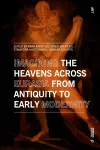
Imagining the Heavens across Eurasia
3 contributors - Paperback
£49.99
Rana Brentjes is an art historian, a curator, and a historian of contemporary German History. She is currently the Digital Content Curator of the research project “Visualization and Material Cultures of the Heavens” at the Max Planck Institute for the History of Science in Berlin. She co-edited the Routledge Handbook on the Sciences in Islamicate Societies (2023) and co-authored “The scientific environment in Samarkand around Ulugh Beg and the Zīj-i Gūrgānī” in Commentaires du fac-simile du Livre des étoiles fixes d’‘Abd al-Raḥmān al-Ṣūfī _Manuscrit BnF Arabe 5036 edited by Anna Caiozzo. In her current work she edits and develops the VoH Database, presents its research potential at workshops and conferences, and works on publishing some of those results. Sonja Brentjes is a historian of science focusing on the histories of mathematics, mapmaking, institutions, translations, travels, and astral imagery in Islamicate societies, the medieval Mediterranean, and early modern Occidental Europe. She co-founded and developped the research project “Visualization and Material Cultures of the Heavens” at the Max Planck Institute for the History of Science in Berlin, which she headed from 2016 to 2021. Her latest publications include edited volumes in cooperation with other colleagues on Narratives on Translation across Eurasian and Africa (2022) and the Routledge Handbook on the Sciences in Islamicate Societies (2023), as well as articles on the Book of the Images of the Fixed Stars by ‘Abd al-Rahman al-Sufi (903–986). Stamatina Mastorakou is leading the research group “Visualization and Material Cultures of the Heavens” at the Max Planck Institute for the History of Science in Berlin. She is a historian of science working on the history of astral knowledge and its material culture. Having earned her PhD in Hellenistic astronomy from Imperial College, London, she has taught and conducted research in Athens, London, New York, and Zurich. She spe¬cializes on Aratus’ Phaenomena and her current work focuses on how ancient astronomical knowledge was intricately shaped through poetry, art, and politics. Dagmar Schäfer is a German-based sinologist and director of Department III at the Max Planck Institute for the History of Science in Berlin. Her monograph The Crafting of the 10,000 Things (UCP, 2011) won the History of Science Society: Pfizer Award in 2012 and the ASAS: Joseph Levenson Prize (Pre-1900) in 2013. In 2020 she was awarded the Gottfried Wilhelm Leibniz Prize. She is currently researching the historical dynamic of concept formation.